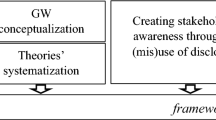Abstract
This paper presents an experimental study oftwo different pollution compliance games:collective vis-à-vis random fining as ameans to regulate non-pointpollution. Using samples from both Costa Ricancoffee mill managers and Costa Rican students,we find that the two games perform equivalentlybut, although they lead to efficient outcomesthrough Nash play in the majority of cases, theobserved frequency of Nash play is lower thantheoretically predicted. Moreover, we rejectthe hypothesis that managers and studentsbehave equally. Off the equilibrium, managerstend to over-abate, whereas students tend tounder-abate. This result suggests theimportance of considering subject pooldifferences in the evaluation of environmentalpolicies by means of experiments, particularlyif those policies involve certain forms ofmanagement decisions.
Similar content being viewed by others
References
Ball, S. B and P.-A. Cech (1996), 'Subject Pool Choice and Treatment Effects in Economic Laboratory Research', Research in Experimental Economics 6, 239–292.
Beattie, J. and G. Loomes (1997), 'The Impact of Incentives Upon Risky Choice Experiments', Journal of Risk and Uncertainty 14, 155–168.
Binmore, K. (1999), 'Why Experiment in Economics', The Economic Journal 109, F16–F24.
Coller, M. and G. Harrison (1997), 'Methods in Experimental Economics: A Review', Journal of International and Comparative Economics 5, 321–334.
Cunningham, W., W. T. Anderson and J. H. Murphy (1974), 'Are Students Real People?' Journal of Business 47(3), 399–409.
Friedman, D and S. Sunder (1994), Experimental Methods, A Primer for Economists. NewYork: Cambridge University Press.
Fudenberg, D. and J. Tirole (1991), Game Theory. Cambridge, Massachusetts: The MIT Press.
Gibbons J. D. and S. Chakraborti (1992), Nonparametric Statistical Inference, 3rd edition. New York: Marcel Dekker.
Herriges, J., R. Govindasamy and J. F. Shogren (1994), 'Budget-Balancing Incentive Mechanisms', Journal of Environmental Economics and Management 27(3), 275–285.
Holmström, Bengt (1982), 'Moral Hazard in Teams', Bell Journal of Economics 13, 324–340.
Kritikos, A. (1993), 'Environmental Policy under Imperfect Information: Comment', Journal of Environmental Economics and Management 25(1), 89–92.
Meran G. and U. Schwalbe (1987), 'Pollution Control and Collective Penalties', Journal of Institutional and Theoretical Economics 143, 616–629.
Nalbantian, H. R. and A. Schotter (1997), 'Productivity under Group Incentives: An Experimental Study', American Economic Review 87(3), 314–341.
Plot, C. (1982), 'Industrial Organization Theory and Experimental Economics', Journal of Economic Literature 20(4), 1485–1527.
Rasmusen, E. (1987), 'Moral Hazard in Risk-Averse Teams', The Rand Journal of Economics 18(3), 428–435.
Segerson, K. (1988), 'Uncertainty and the Incentives for Nonpoint Pollution Control', Journal of Environmental Economics and Management 15(1), 87–98.
Siegel, S. and N. J. Castellan (1988), Nonparametric Statistics for the Behavioral Sciences. New York: McGraw-Hill.
Smith, V. (1982), 'Microeconomic Systems as an Experimental Science', American Economic Review 72(5), 923–955.
Spraggon, J. (2002), 'Exogenous Targeting Instruments as a Solution to Group Moral Hazards', Journal of Public Economics 84, 427–456.
Starmer, C. (1999), 'Experimental Economics: Hard Science or Wasteful Tinkering', The Economic Journal 109, F5–F15.
Starmer, C. and R. Sugden (1991), 'Does the Random-Lottery Incentive System Elicit True Preferences? An Experimental Investigation', American Economic Review 81, 971–978.
Xepapadeas, A. (1991), 'Environmental Policy under Imperfect Information: Incentives and Moral Hazard', Journal of Environmental Economics and Management 20, 113–126.
Rights and permissions
About this article
Cite this article
Alpízar, F., Requate, T. & Schram, A. Collective versus Random Fining: An Experimental Study on Controlling Ambient Pollution. Environmental and Resource Economics 29, 231–252 (2004). https://doi.org/10.1023/B:EARE.0000044608.66145.0c
Issue Date:
DOI: https://doi.org/10.1023/B:EARE.0000044608.66145.0c




